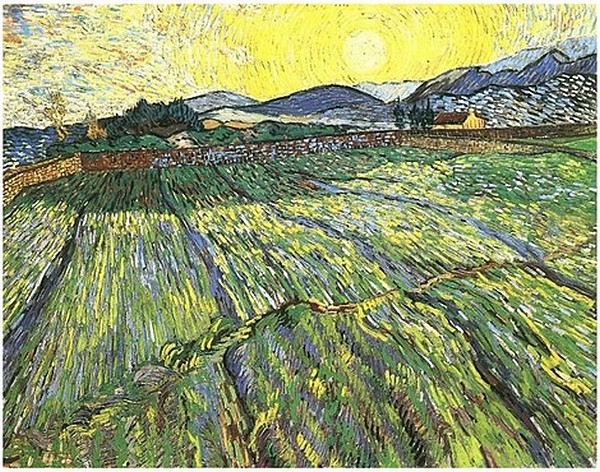
Thus we arrive at Berlin, at the salon of Friedrich August von Stägemann, a nobleman who had a circle of friends, most of them artists, among them Wilhelm Müller. If you usually read novels from the early nineteenth century or set in that time, you might know that a usual parlour game was to stage a play: groups of young people adapted or wrote the play, made the sets and the costumes, rehearsed and performed the play in front of their parents and older members of their circle. In Mansfield Park by Jane Austen, for instance, there is a game of that kind. There was a similar parlour game in Germany, the liederspiel, where the play basically consisted of songs: the roles were distributed among the actors and everyone had to write the texts of their own songs, which were musicalized by some members of the group.
That's how Müller came about to write his first poems of Die schöne Müllerin, it all started with a game. Ludwig Berger, piano teacher of one of the young ladies involved in the liederspiel, was in charge of writing the music and found Wilhelm's poems, five out of ten, much better than the rest. He encouraged him to write the full story and Müller finally published the collection of twenty-five poems in 1820, included in Sieben und siebzig Gedichte aus den hinterlassenen Papieren eines reisenden Waldhornisten I (I love that name!), that Franz Schubert read in 1823 and became one of his masterpieces, the cycle of twenty lieder Die Schöne Müllerin.
Some time ago, we listen to the first song, Das Wandern, the beginning of the journey of the apprentice miller. This week we're listening to the 8th song, Morgengruß. Between the two songs, the man arrives at a mill and he has falls love with the miller's daughter. But he's very young or very shy, or both, and he doesn't dare to speak of love to her. She might even have not noticed him as he's just one of his father's apprentices. In Morgengruß (Morning Greetings) the miller stares at the girl’s window in the morning hoping she wakes up and opens it. As in other songs in the cycle, it's difficult to distinguish between the boy’s reality and his imagination. We don't know if he has been waiting for a long time or he’s just passing by the window; if she has turned her face away or if she hasn’t even noticed him. To our understanding, almost two hundred years later, the miller's behavior may be somehow disturbing, as if he was stalking the miller's daughter, but when we listen to Schubert's music we realized that there isn't anything wrong, he's just a young man in love. The song exudes innocence and sweetness; the strophic structure and the simplicity of the accompaniment offer an unmistakable pastoral atmosphere announcing a radiant day and removes any dark trace from the boy.
Morgengruß is a gorgeous song, one more in this cycle that we can hear at the Palau de la Música Catalana, in Barcelona, on Sunday 19th April. The performers will be, as on this post, the tenor Mark Padmore and by Paul Lewis
Guten Morgen, schöne Müllerin!
Wo steckst du gleich das Köpfchen hin,
Als wär dir was geschehen?
Verdrießt dich denn mein Gruß so schwer?
Verstört dich denn mein Blick so sehr?
So muß ich wieder gehen.
O laß mich nur von ferne stehn,
Nach deinem lieben Fenster sehn,
Von ferne, ganz von ferne!
Du blondes Köpfchen, komm hervor!
Hervor aus eurem runden Tor,
Ihr blauen Morgensterne!
Ihr schlummertrunknen Äugelein,
Ihr taubetrübten Blümelein,
Was scheuet ihr die Sonne?
Hat es die Nacht so gut gemeint,
Daß ihr euch schließt und bückt und weint
Nach ihrer stillen Wonne?
Nun schüttelt ab der Träume Flor
Und hebt euch frisch und frei empor
In Gottes hellen Morgen!
Die Lerche wirbelt in der Luft,
Und aus dem tiefen Herzen ruft
Die Liebe Leid und Sorgen.
Good morning, beautiful millermaid!
Why do you so promptly turn your little head,
As if something has happened to you?
Do you dislike my greetings so profoundly?
Does my glance disturb you so much?
Then I must go on again.
O let me only stand from afar,
Watching your dear window,
From afar, from quite far away!
Your blonde little head, come out!
Come out from your round gate,
You blue morning stars!
You slumber-drunk little eyes,
You flowers, troubled with dew,
Why do you shy from the sun?
Has night been so good to you
That you close and bow and weep
for her quiet joy?
Now shake off the gauze of dreams
And rise, fresh and free
in God's bright morning!
The lark warbles in the sky;
And from the heart's depths,
Love calls away suffering and worries.
(traducció d'Emily Ezust)













Comments powered by CComment